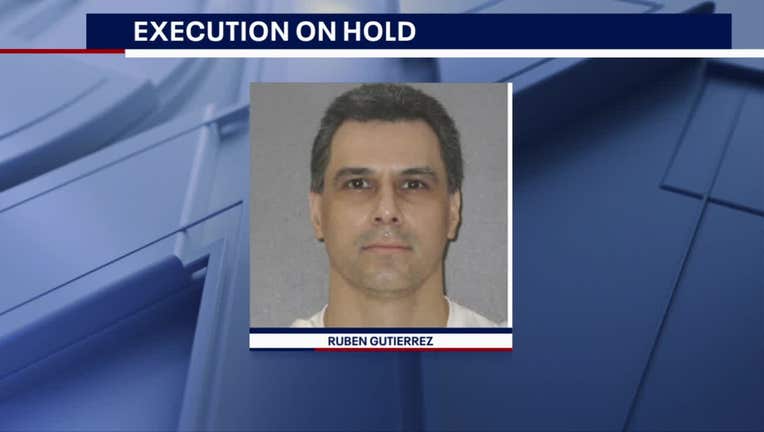Supreme Court grants Texas man a stay of execution just before his scheduled lethal injection

HUNTSVILLE, Texas - The U.S. Supreme Court granted a stay of execution for a Texas man 20 minutes before he was to receive a lethal injection Tuesday evening. The inmate has long maintained DNA testing would help prove he wasn't responsible for the fatal stabbing of an 85-year-old woman during a home robbery decades ago.
The nation’s high court issued the indefinite stay shortly before inmate Ruben Gutierrez was to have been taken to the death chamber of a Huntsville prison.
Gutierrez was condemned for the 1998 killing of Escolastica Harrison at her home in Brownsville in Texas’ southern tip. Prosecutors said the killing of the mobile home park manager and retired teacher was part of an attempt to steal more than $600,000 she had hidden in her home because of her mistrust of banks.
Gutierrez has sought DNA testing that he claims would help prove he had no role in her death. His attorneys have said there’s no physical or forensic evidence connecting him to the killing. Two others also were charged in the case.
The high court's brief order, released about 5:40 p.m. CDT, said its stay of execution would remain in effect until the justices decide whether they should review his appeal request. If the court denies the request, the execution reprieve would automatically be lifted.
Gutierrez, who had been set to die after 6 p.m. CDT, was in a holding cell near the death chamber when prison warden Kelly Strong advised him of the court's intervention.
Featured
Biden to back major Supreme Court changes amid decision outrage: Report
President Biden is reportedly planning to endorse major changes to the U.S. Supreme Court, including proposals for legislation to establish term limits for the justices and an enforceable ethics code.
"He was visibly emotional," prison spokeswoman Amanda Hernandez said, adding he was not expecting the court stay. "We asked him if he wanted to make a statement but he needed a minute."
"He turned around to the back of the cell, covered his mouth. He was tearing up, speechless. He was shocked."
She said Gutierrez then prayed with a prison chaplain and added: "God is great!"
Gutierrez has had several previous execution dates in recent years that have been delayed, including over issues related to having a spiritual adviser in the death chamber. In June 2020, Gutierrez was about an hour away from execution when he got a stay from the Supreme Court.
In the most recent appeal, Gutierrez’s attorneys had asked the Supreme Court to intervene, arguing Texas has denied his right under state law to post-conviction DNA testing that would show he would not have been eligible for the death penalty.
His attorneys argued that various items recovered from the crime scene — including nail scrapings from Harrison, a loose hair wrapped around one of her fingers and various blood samples from within her home — have never been tested.
"Gutierrez faces not only the denial of (DNA testing) that he has repeatedly and consistently sought for over a decade, but moreover, execution for a crime he did not commit. No one has any interest in a wrongful execution," Gutierrez’s attorneys wrote in their petition to the Supreme Court.
Shawn Nolan, an attorney for Gutierrez, expressed pleasure with the court's decision late Tuesday. "We are hopeful that now the Court has stepped in to stop this execution, we can ultimately accomplish the DNA testing to prove that Mr. Gutierrez should not be executed now or in the future," Nolan said in an emailed statement.
Prosecutors have said the request for DNA testing is a delay tactic and that Gutierrez was convicted on various pieces of evidence, including a confession in which he admitted to planning the robbery and that he was inside her home when she was killed.
Featured
U.S. Supreme Court to review case on Texas porn law
A Texas law requiring age-verification for pornographic websites is being challenged by the porn industry because they say it violates free speech protections.
Gutierrez was convicted under Texas’ law of parties, which says a person can be held liable for the actions of others if they assist or encourage the commission of a crime.
In their response to Gutierrez’s Supreme Court petition, the Texas Attorney General’s Office and the Cameron County District Attorney’s Office had said state law does not provide "for postconviction DNA testing to show innocence of the death penalty and, even if it did, Gutierrez would not be entitled to it."
Lower courts have previously denied Gutierrez’s requests for DNA testing.
Authorities said Gutierrez befriended Harrison so he could rob her. Prosecutors said Harrison hid her money underneath a false floor in her bedroom closet.
Two of Harrison's nephews and three of their friends were to have witnessed the execution. They declined to comment on the court's reprieve.
Police charged three people in this case: Rene Garcia, Pedro Gracia and Gutierrez. Rene Garcia is serving a life sentence in a Texas prison while Pedro Gracia, who police said was the getaway driver, remains at large.
___
Lozano reported from Houston.



